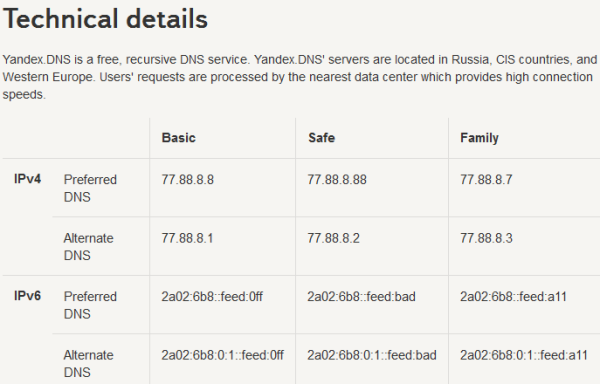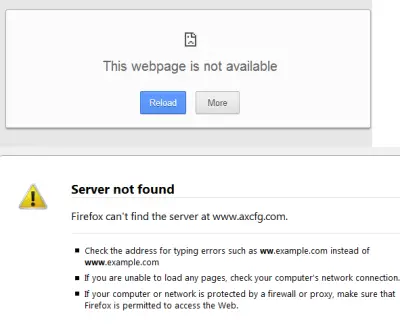We have reviewed many free DNS on TheWindowsClub to assist you to choose the fastest DNS and thereby a faster Internet. We also covered the term DNS in detail – explaining how it works, and also how to manage web browsing speed by changing DNS settings. In short, Domain Name Service (DNS) servers are computers that translate the hyperlinks (URLs), you enter into the address bar of your browser, into related IP addresses so that the computer you are using can connect to the server (website) you want. In the same series, this review of Yandex DNS checks out the speed, security, and other options, if any.
Yandex DNS Review

Yandex.DNS is Fast
Compared to the Comodo Secure DNS and OpenDNS I was using earlier, Yandex DNS seemed to work faster. When I selected Secure Mode. Yandex.DNS offers three sets of DNS servers:
- Basic: For increasing the speed of Domain Name Resolution so that the Internet browsing becomes a bit faster. The server IP addresses, in this case, are: 77.88.8.8 and 77.88.8.1
- Secure: Since Yandex DNS offers secure DNS servers under a different group, I assume that the above (BASIC) DNS servers are used just for resolution and do not check if the website is malicious. If you want to make sure that you are not visiting any infected website, use this package. The DNS Servers, in this case, are 77.88.8.88 and 77.88.8.2. Since I did not want any risk, I checked Yandex using these DNS Servers. The speed of domain name resolution was still faster than Comodo DNS that too provides you good protection against malware while offering a DNS service as well.
- Parental Controls: This set of Yandex DNS servers make sure your kids or anyone else in the family is not able to visit websites offering adult content, violence, and similar things that can affect the brain adversely. The DNS servers to resolve DNS while avoiding X rated websites are 77.88.8.7 and 77.88.8.3
I was primarily concerned with my copy of Google Chrome that has been taking ages for resolution of DNS – of course, due to the number of extensions I use on it. I tried many DNS servers to see if they can improve the Chrome DNS resolution – including Google’s 8.8.8.8 and OpenDNS as well as Comodo. I also used NameBench DNS Tester to check out the fastest DNS servers for my location, and it suggested Google DNS servers. Surprisingly, the Yandex DNS proved faster compared to Google DNS too.
One of the reasons why I think Yandex DNS servers are fast is that the service is quite new and as of now, has little traffic. However, would want someone from Yandex to comment on this.
Do note that while testing Yandex, I made changes to the router rather than just making changes to the computer on the network. I am not sure if that had any additional effect. Before that, the router was set to auto-detect DNS that I guess did use the DNS servers mentioned on individual computers. But since other computers too were facing slowdown issues with domain resolution, I changed the router DNS servers. As am not pretty updated with the hardware field, I will leave it to you to figure out if changing DNS servers in the Router makes resolution faster than configuring individual computers on the network.
Parked Pages and ISP Interception
For once, I felt happy that I did not get a message from my ISP, saying it could not resolve the DNS when I entered a test domain (something like asdedfrf.com). Even with Comodo DNS, the ISP used to present pages not found on his own list of websites to visit. In the case of Yandex, both Firefox and Chrome showed 404 Error as shown in the image below. I did not test IE as IE11 has proven to be fast, and I don’t have any issues with it as of now.
There were no parked pages either. Normally, when you mistype an address on OpenDNS, with the message of the website not being available, you also get a list of suggestions that are adverts. With Yandex DNS, it was simply “Page Not Found” and nothing more. That is good especially when you are tricked by the unwanted suggestions that make you believe you mistyped the URL. Often, you type the correct URL and the site could be down or taken off or maybe expired. With parked pages showing suggestions, you get doubts if you typed the wrong URL. With the absence of such ads, such doubts too are eliminated.
Management of Adult Sites
I could not find anything that lets you register with the site/service as is the case with OpenDNS Parental Controls. There is a page explaining technical details on how they sort out the adult sites. There is no way you can use the Yandex DNS service to customize the browsing behavior of others on your network. With Open DNS and Jumpto Browser, you can go ahead to restrict/block certain websites from within the Control Panel they offer. Yandex, I guess, is run based on some kind of database(s) that categorizes the websites and thus, may not be 100% foolproof.
Yandex.DNS – Summary
It would not be fair to expect everything from a free service, so if you need better parental controls, you can go to OpenDNS or Angel DNS or some other DNS services providing such controls. But if your requirement is the high-speed Internet and secure browsing, Yandex is the one for you. For the time being, until I come across anything better, the Yandex Secure DNS is going to stay in my router configuration. Visit yandex.com to get started.
Is Yandex DNS safe?
Yes, Yandex DNS is safe and secure to use. Whether you want to get a faster internet connection to unblock regionally blocked content on the internet, you can make use of this DNS without any problem. The best thing is that you can use a VPN along with this DNS service.
What is the safest and fastest DNS?
There are multiple safe and fast DNS services available for you. However, if you can try Google Public DNS, OpenDNS, Yandex DNS, OpenNIC, etc. On the other hand, DNSWatch is also a good source of DNS. No matter whether you use Windows 11, Windows 10, or any other version, you can certainly opt for all the DNS services.
Please do share what DNS services you are using and why!
